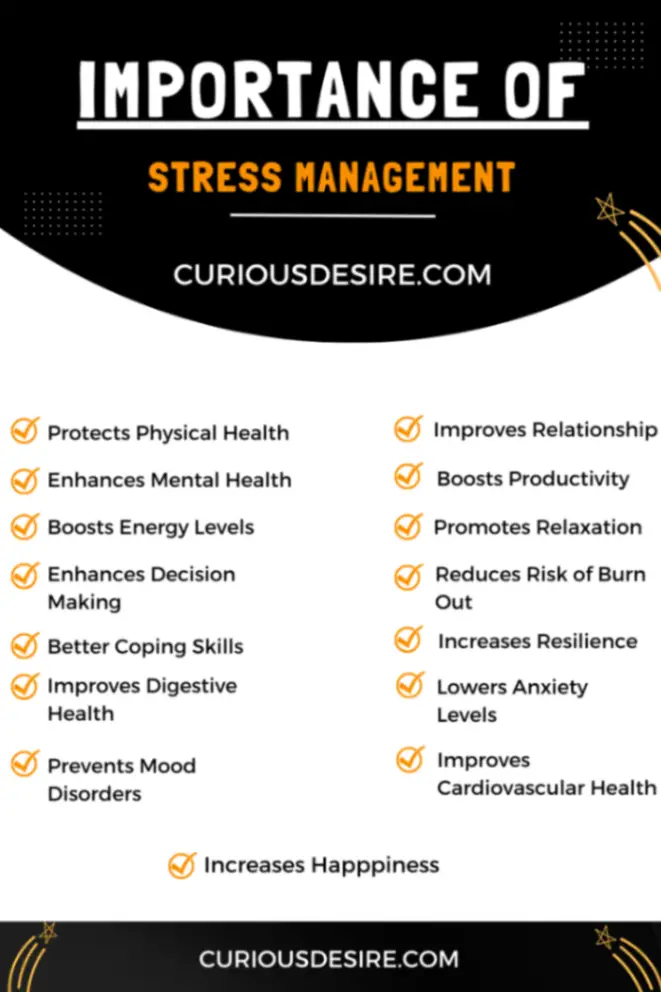In today’s fast-paced world, stress has become a common occurrence for many people, leading to various health issues and a diminished quality of life.
From tight deadlines at work to personal obligations and societal pressures, it often feels like we’re constantly battling against a rising tide of stress.
However, incorporating effective stress management techniques into your daily routine can make a world of difference in how you navigate life’s challenges.
Let’s delve into the importance of stress management and explore strategies to help you live a healthier and happier life.
5 most common reasons for the importance of stress management:
- Protects Physical Health
- Enhances Mental Health
- Improves Relationships
- Boosts Productivity
- Lowers Anxiety Levels

1. Protects Your Physical Health
One of the primary reasons why stress management is crucial is its impact on physical health.
Chronic stress has been linked to a variety of health problems, including heart disease, obesity, diabetes, and digestive issues.
By implementing stress management techniques such as exercise, meditation, deep breathing, and relaxation exercises, you can lower your stress levels and reduce the risk of developing these health conditions.
Regular physical activity is especially beneficial for managing stress, as it releases endorphins, the body’s natural stress relievers.
Engaging in activities like walking, yoga, or swimming can help you unwind and improve your overall well-being
2. Enhances Mental Health
Stress not only affects our physical health but also takes a toll on our mental well-being.
Prolonged stress can contribute to anxiety, depression, mood swings, and other mental health issues.
By practicing stress management techniques, you can cultivate resilience, improve your coping skills, and protect your mental health.
Mindfulness meditation, cognitive-behavioral therapy, journaling, and engaging in hobbies are effective ways to reduce stress and promote mental clarity.
3. Improves Relationships
Stress can strain relationships with family members, friends, and colleagues.
When stressed, you may become irritable, impatient, or withdrawn, leading to conflicts and misunderstandings.
Effective stress management can help you communicate more effectively, set boundaries, and navigate relationship challenges with grace.
By developing healthy coping mechanisms and practicing self-care, you can improve your emotional intelligence and build stronger connections with the people around you.
Taking time for yourself, prioritizing self-care activities, and seeking support can help you maintain healthy relationships and create a supportive network.
4. Boosts Productivity
Stress can significantly impact your performance at work or school, leading to decreased productivity, poor concentration, and burnout.
- By managing stress effectively, you can enhance your focus, creativity, and problem-solving skills, leading to improved performance and job satisfaction.
- Time management, setting realistic goals, delegating tasks, and taking regular breaks are essential strategies for managing stress in the workplace.
- By maintaining a healthy work-life balance and practicing mindfulness, you can increase your productivity and reduce workplace stress.

5. Boosts Energy Levels
Stress management plays a crucial role in regulating energy levels by mitigating the draining effects of chronic stress.
- Reduction of Stress Hormones: Chronic stress triggers the release of stress hormones like cortisol and adrenaline, which can disrupt the body’s natural energy-regulating mechanisms. By practicing stress management techniques, you can lower your stress hormone levels, preventing the constant drain on energy resources.
- Enhanced Sleep Quality: Stress often interferes with sleep, leading to insomnia, fragmented sleep patterns, and poor sleep quality. Adequate restorative sleep is essential for replenishing energy levels and maintaining overall well-being.
- Improved Mental Clarity: Excessive stress can cloud the mind, impairing cognitive function, concentration, and mental clarity. By managing stress effectively, you can clear mental clutter, enhance focus, and maintain optimal cognitive performance.
- Promotion of Physical Activity: Stress management encourages regular physical activity, essential for boosting energy levels and overall vitality.
6. Enhances Decision Making
Stress can impair cognitive function, making it difficult to think clearly and make rational decisions.
By managing stress effectively, you can reduce cognitive load and improve your decision-making abilities.
When stress levels are kept in check, the mind becomes clearer, enabling you to weigh options, analyze situations, and make informed choices.
This clarity of thought allows for more strategic decision-making, minimizing the likelihood of errors or impulsive judgments.
7. Reduces Risk of Burnout
Burnout is a state of physical, emotional, and mental exhaustion caused by prolonged exposure to excessive stress and overwhelming work demands.
Effective stress management helps you recognize and address early signs of burnout, such as fatigue, cynicism, and decreased productivity.
By implementing stress-reducing techniques such as time management, setting boundaries, and practicing self-care, you can prevent burnout and maintain a healthy work-life balance.
This proactive approach preserves energy reserves, sustains motivation, and prevents the detrimental effects of burnout on overall well-being.
8. Better Coping Skills
Stress management equips you with effective coping skills to navigate challenging situations and cope with adversity constructively.
Rather than resorting to maladaptive coping mechanisms such as avoidance, denial, or substance abuse, learn healthier ways to manage stressors.
These may include problem-solving strategies, seeking social support, practicing mindfulness, or engaging in relaxation techniques.
By developing adaptive coping skills, you build resilience, enhance emotional regulation, and maintain psychological well-being in the face of stressors.
9. Increases Resilience
Resilience refers to the ability to bounce back from setbacks, adapt to change, and thrive in adversity.
Stress management plays a pivotal role in cultivating resilience by strengthening coping mechanisms, encouraging self-awareness, and promoting a positive mindset.
When you effectively manage stress, you develop greater emotional resilience, allowing you to withstand challenges with resilience and perseverance.
10. Lowers Anxiety Levels
Chronic stress is closely linked to anxiety disorders, characterized by persistent feelings of worry, fear, and apprehension.
Effective stress management techniques, such as mindfulness meditation, deep breathing exercises, and progressive muscle relaxation, help regulate your stress response.
These practices promote a state of calmness, grounding you in the present moment and reducing excessive worry about the future.
By managing stress effectively, you can alleviate symptoms of anxiety, enhance emotional well-being, and regain a sense of control over your lives.
11. Improves Digestive Health
The gut-brain connection is well-established, with stress exerting a significant impact on digestive health.
Chronic stress can disrupt digestive processes, leading to symptoms such as indigestion, bloating, and irritable bowel syndrome (IBS).
Stress management techniques, including relaxation exercises, dietary modifications, and gut-directed therapies, help alleviate gastrointestinal symptoms and improve digestive function.
By reducing stress levels, you can promote a healthy balance of gut bacteria, enhance nutrient absorption, and alleviate digestive discomfort.
12. Enhances Self-esteem
Stress can erode self-esteem and self-confidence, leading to negative self-talk, self-doubt, and feelings of inadequacy.
Effective stress management involves breeding self-awareness, challenging negative thought patterns, and practicing self-compassion.
By cultivating a positive self-image and acknowledging personal strengths and accomplishments, you can enhance your self-esteem and self-worth.
Stress management techniques such as assertiveness training and boundary-setting empower you to advocate for your needs, further bolstering self-esteem and confidence.
13. Promotes Relaxation
In today’s fast-paced world, relaxation has become a rare commodity amidst the hustle and bustle of daily life.
Stress management emphasizes the importance of relaxation as a fundamental aspect of well-being.
Engaging in activities such as meditation, yoga, tai chi, or spending time in nature promotes relaxation and tranquility.
These relaxation techniques activate the body’s relaxation response, reducing muscle tension, lowering blood pressure, and calming the mind.
By incorporating regular relaxation practices into their routine, you can counteract the detrimental effects of stress, and promote overall relaxation and well-being.

14. Prevents Mood Disorders
Chronic stress is strongly linked to the development of mood disorders such as anxiety and depression.
By effectively managing stress, you can mitigate the risk of these conditions.
Stress management techniques such as mindfulness, relaxation exercises, and cognitive-behavioral therapy (CBT) help you cope with stressors, regulate emotions, and maintain a more stable mood state.
This proactive approach can significantly reduce the likelihood of experiencing debilitating mood disorders.
15. Increases Happiness
Prolonged stress can diminish one’s overall sense of happiness and satisfaction with life.
By implementing stress management strategies, you can cultivate a greater sense of well-being and contentment.
The following activities are effective in reducing stress levels and promoting feelings of happiness.
- Regular exercise
- Spending time with loved ones
- Pursuing hobbies
- Practicing gratitude
Learning to prioritize tasks, set boundaries, and maintain a healthy work-life balance can contribute to a more fulfilling and enjoyable lifestyle.
16. Better Immune Function
Chronic stress has been shown to weaken the immune system, making you more susceptible to infections and illnesses.
Effective stress management supports immune function by reducing the production of stress hormones such as cortisol, which can suppress immune activity.
Moreover, stress-reducing activities enhance immune function directly by promoting the production of immune-boosting substances and improving overall physiological resilience.
By managing stress effectively, you can strengthen your immune defenses and reduce your susceptibility to illness.
17. Improves Cardiovascular Health
Chronic stress can significantly impact cardiovascular health, increasing the risk of conditions such as hypertension, heart disease, and stroke.
Stress management techniques such as meditation, deep breathing exercises, and regular physical activity help lower stress hormones like cortisol and reduce blood pressure.
By managing stress effectively, you can improve heart health, reduce the risk of cardiovascular diseases, and promote overall well-being.
18. Enhances Social Connections
Excessive stress can lead to social withdrawal, strained relationships, and feelings of isolation.
Stress management encourages you to engage in activities that promote social connections, such as spending time with friends and family, participating in group activities, and volunteering.
By reducing stress levels and fostering positive social interactions, stress management enhances emotional support, strengthens relationships, and promotes a sense of belonging and community.
19. Enhances Job Satisfaction
Workplace stress is a significant contributor to employee dissatisfaction, burnout, and turnover.
Stress management initiatives implemented by organizations can improve job satisfaction and employee morale.
By empowering employees to manage stress effectively, organizations can foster a healthier and more productive workforce, leading to increased job satisfaction and overall organizational success.
20. Longevity
Chronic stress has been linked to premature aging and a shortened lifespan.
Effective stress management not only improves physical health but also promotes psychological well-being, resilience, and coping skills.
By reducing the negative impact of stress on the body and mind, stress management contributes to longevity and a higher quality of life.
Adopting healthy coping strategies, practicing self-care, and cultivating a positive outlook on life are essential components of stress management.
Practical Tips for Effective Stress Management
Here are five Practical Tips for Effective Stress Management.
1. Prioritize Self-Care
Make time for activities that bring you joy and relaxation, whether it’s reading a book, taking a bath, or going for a walk in nature.
2. Practice Mindfulness
Stay present in the moment and cultivate awareness of your thoughts and emotions through mindfulness meditation or deep breathing exercises.
3. Stay Active
Engage in regular physical activity to release built-up tension and boost your mood.
Exercise is a powerful stress reliever and mood enhancer.
4. Maintain a Healthy Lifestyle
Eat a balanced diet, get adequate sleep, and limit your intake of caffeine and alcohol to support your body’s ability to cope with stress.
5. Seek Support
Don’t hesitate to reach out to friends, family, or a mental health professional for support when you’re feeling overwhelmed.
Source: The Recovery Village Drug and Alcohol Rehab
Conclusion
Stress management is not a luxury but a necessity for maintaining your health and well-being.
By incorporating effective stress management techniques into your daily routine, you can protect your physical and mental health, and enhance your overall quality of life.
Remember, managing stress is a lifelong journey, and small changes can lead to significant benefits in the long run.
Start implementing these strategies today and pave the way for a healthier and happier life ahead.
Importance of Stress Management FAQs
1. What are the common sources of stress?
Common sources of stress include work pressure, financial problems, relationship issues, major life changes, and health concerns. Additionally, external factors like noise, pollution, and overcrowding can contribute to stress.
2. How does stress impact our health?
Stress can have a profound impact on both mental and physical health. It can lead to symptoms such as headaches, muscle tension, fatigue, irritability, difficulty concentrating, and insomnia.
3. What are some effective stress management techniques?
Effective stress management techniques include deep breathing exercises, meditation, mindfulness practices, regular physical activity, adequate sleep, a healthy diet, time management, setting boundaries, seeking social support, and engaging in hobbies or activities that bring joy.
4. What role does exercise play in stress management?
Exercise is a powerful stress reliever as it releases endorphins, chemicals in the brain that act as natural painkillers and mood elevators.
5. Can diet influence stress levels?
Yes, diet plays a significant role in managing stress. A balanced diet rich in fruits, vegetables, whole grains, lean proteins, and healthy fats provides essential nutrients that support the body’s stress response.
6. What role does social support play in managing stress?
Social support from friends, family, or support groups can provide emotional validation, practical assistance, and a sense of belonging, buffering the negative effects of stress.